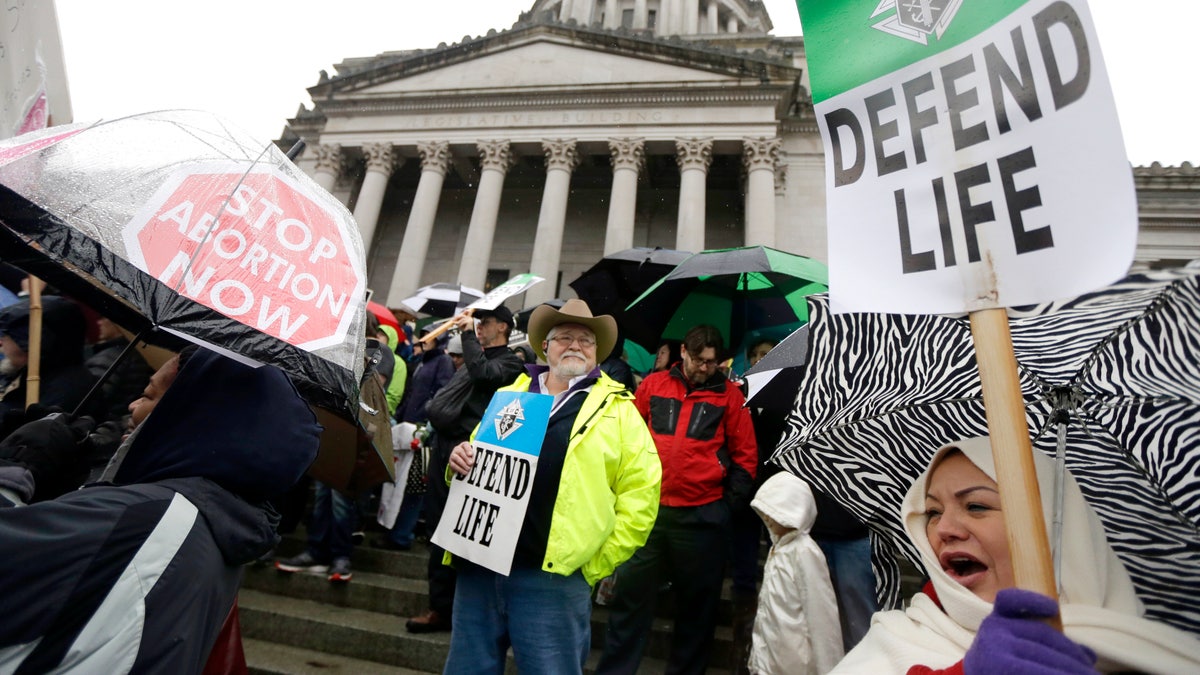
Anti-abortion demonstrators take part in a rally, Tuesday, Jan. 19, 2016, at the Capitol in Olympia, Wash. (AP Photo/Ted S. Warren)
This week, hundreds of thousands of Americans will participate in the annual March for Life in Washington, D.C. as well as in other marches on the West Coast and in cities, town and villages everywhere in between. This flood of concerned citizens represents a deeply unsettled issue in our country: the lives of children in their first nine months are not protected by law.
Those who are marching are determined to change that, and to expand the protections of the law to these smallest and most vulnerable members of the human family.
These citizens who are deeply committed to ending abortion do not restrict their pro-life activism to marching. Indeed, these are the same people who run pregnancy centers that provide alternatives to abortion each day, carry out healing ministries for those who have had abortions, undertake numerous educational efforts to help people understand the legal, moral, and sociological dimensions of abortion and the damage it does, preach sermons about how abortion violates the Word of God, and much more.
And they work to elect pro-life candidates.
Although the March for Life itself is not a political event, a keen awareness and a strong motivation of the marchers themselves this year is the fact that we have before us in 2016 the most important election we have ever faced.
The March for Life is on January 22 precisely because the Supreme Court ruled on that day in 1973, through the twin decisions Roe vs. Wade and Doe vs. Bolton, that abortions can be performed throughout pregnancy. Marchers this year are keenly aware that the next President and Senate will have the opportunity to substantially shape the court in one direction or the other. And on the issue that these marchers care most about -- abortion -- the Republican and Democratic parties are diametrically opposed.
At this point in the presidential race, the people who will be marching on Friday in Washington have not coalesced behind a single candidate. On the abortion issue, they have a lot of great options from which to choose. But there are a few points that do represent a consensus among this crowd:
a) Legal abortion is not just bad policy; it redefines America and it redefines the relationship between government and human rights. Our right to life comes from God, not government. Therefore, not only should government not legalize abortion; it can't. To try to do so is beyond its authority. Roe vs. Wade is not just wrong; it's invalid.
b) The right to life is not the only issue to consider in evaluating a candidate, but it is the foundational issue. Without life, we don't have anything. And if a politician can't respect the life of a little baby, how can he or she respect your life or mine? Just the fact that someone is prolife does not necessarily qualify him or her for public office; but justifying abortion does in fact disqualify a candidate.
c) It is not enough for us to know what a candidate believes about abortion and the unborn child; we want to know what the candidate is willing to do to end abortion and protect the unborn child.
d) While politics isn't the ultimate answer to solving the abortion problem, it's an essential part of the answer. Changing minds and hearts is not enough; public policy has to change so that the weak can be protected from those who hearts and minds have not changed.
One of the roles that my organization has in the March for Life is that we organize the Youth Rally that takes place the day before, and during that youth rally, I will give a practical presentation about the elections of 2016. We will teach them how to foster voter registration, how to use voter guides, and how to get people to the polls, particularly by utilizing early voting. We will initiate an effort called Drivers for Life, recruiting volunteers to bring people to the polls who otherwise may not find it easy to get there.
Likewise, at the interdenominational service in Constitution Hall on the morning of the March for Life, I will preach about the elections, and demonstrate the kind of fruit elections can bear by honoring Governor Sam Brownback of Kansas for being the first governor to sign into law a measure protecting unborn children from dismemberment abortion.
I will also preach about the fact -- which I examine at length in my book Abolishing Abortion -- that the instructions pastors are sometimes given by their own church bodies to "avoid even appearing to oppose or discredit a political party" is not workable in the light of the Church's clear pro-life position and the Democratic party's clear support of abortion.
I don’t mean that the Church should be a partisan political machine; I mean that the Church should be the Church, clearly articulating her position, no matter what partisan accusations that may generate.
And on this, you will find a consensus among the people who march this Friday. We will march for life, and our march on the streets will become a march into the voting booths to vote this November for public servants who know the difference between serving the public and killing the public.








































